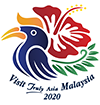Malaysia cordially invites you to the seventh edition of the Asian National Museums Association (ANMA) Meeting and Conference, which will be held from 29 to 31 October 2019. Organised by the Department of Museums Malaysia, the event will comprise two key components:
7TH ASIAN NATIONAL MUSEUMS ASSOCIATION (ANMA) EXECUTIVE COMMITTEE MEETING
(FOR EXECUTIVE COMMITTEE MEMBERS AND DELEGATES ONLY)
The ANMA meeting is a closed door event in which its members explore cooperative measures for the development of museums within Asia as a region and to promote active exchange among Asian national museums.
The meeting will be chaired by the Director General of the Department of Museums Malaysia, who is the appointed chairperson of ANMA and the President of the Executive Committee.
7TH ASIAN NATIONAL MUSEUMS ASSOCIATION (ANMA) CONFERENCE
(FOR DELEGATES AND MEMBERS OF THE PUBLIC)
The theme of the conference is “Social Unity through Culture, Art and History: The Museum Challenges”.
Unity among multicultural and diverse societies through aspects of culture, art and history is important in achieving solidarity and union of a nation. This unity is important because a unified nation can develop and flourish in various fields as well as enjoy life peacefully. Therefore, museum institution plays an important role in building cultural identity by celebrating diversity of race, culture, customs and religion in a country.
Museum institution should not only be seen as repository of national treasures yet it has much more to offer. Museum programs and activities that are innovative and creative are able to foster unity/harmony as well as producing a cultured nation. Nevertheless, museum institutions face various obstacles in achieving this goal in this era of globalization. This conference will discuss issues, challenges and solutions from different point of views among national museums from Asian countries that have reached a record of success in addressing the issue of unity/harmony through the role of culture, art and history in their respective countries.
The conference is open to the public and participation from over 16 different regional institutions are expected.

.jpg)


